外研版高中英语选修八Module1 Deep South- Reading and vocabulary课件(64张PPT)
文档属性
| 名称 | 外研版高中英语选修八Module1 Deep South- Reading and vocabulary课件(64张PPT) |

|
|
| 格式 | zip | ||
| 文件大小 | 11.2MB | ||
| 资源类型 | 教案 | ||
| 版本资源 | 外研版 | ||
| 科目 | 英语 | ||
| 更新时间 | 2022-03-09 08:48:01 | ||
图片预览

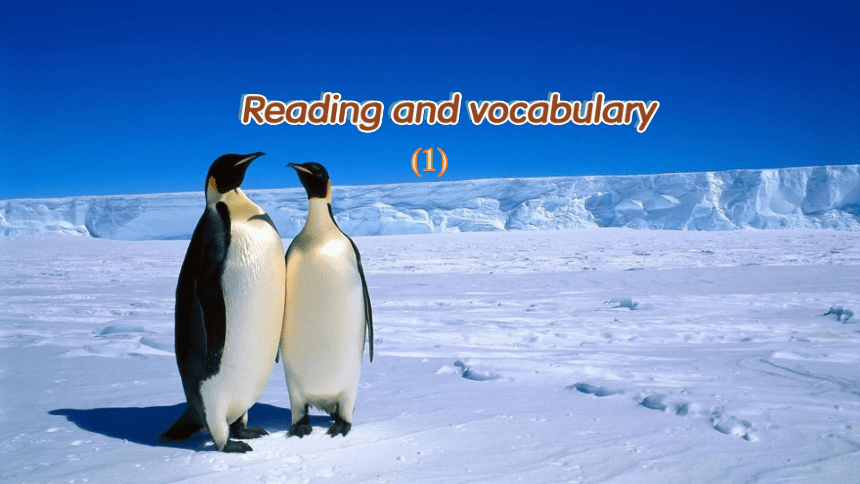
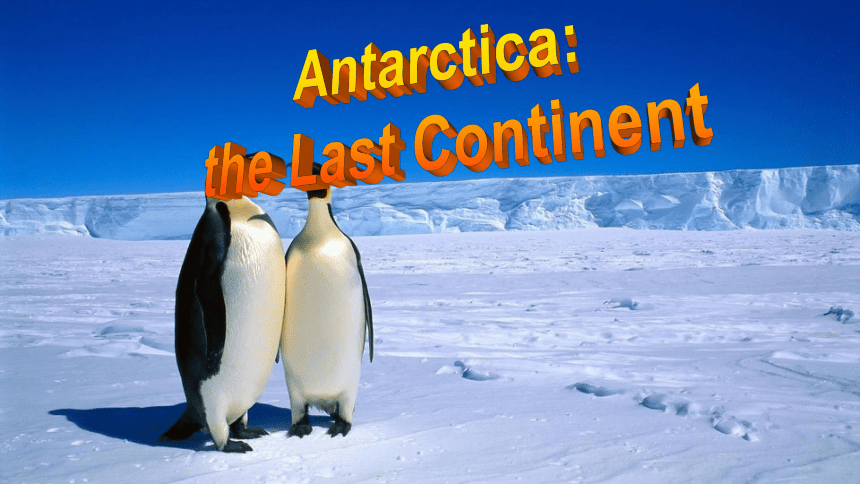
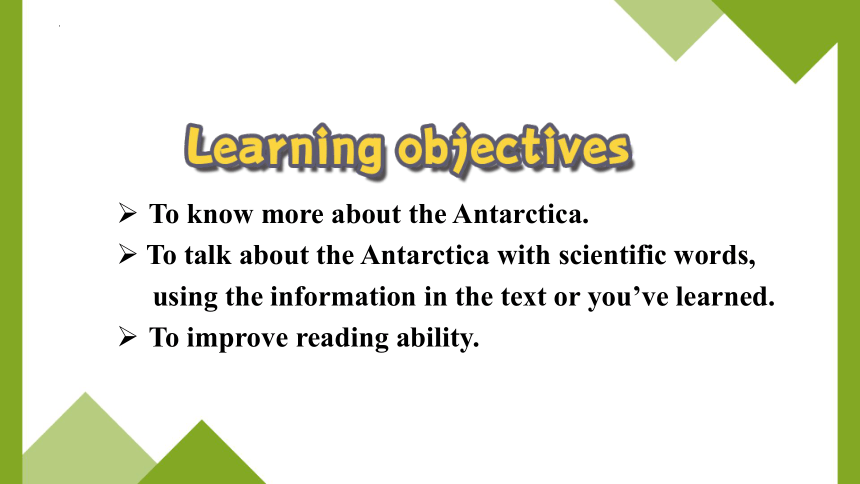
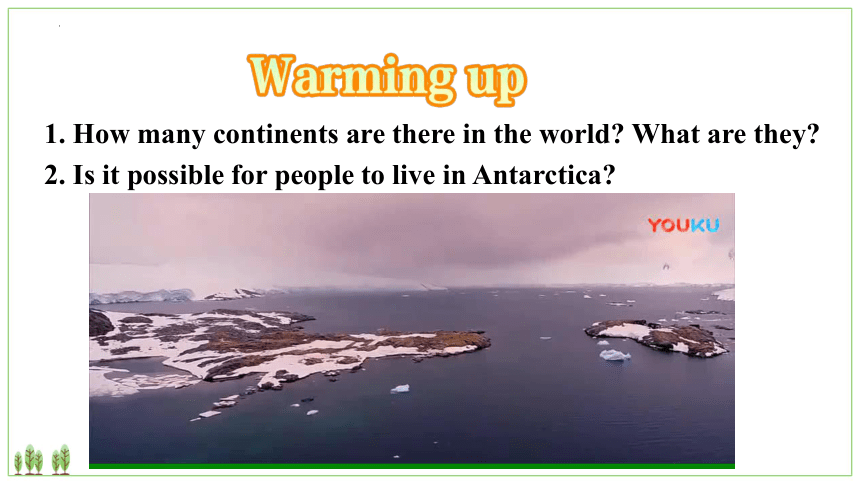
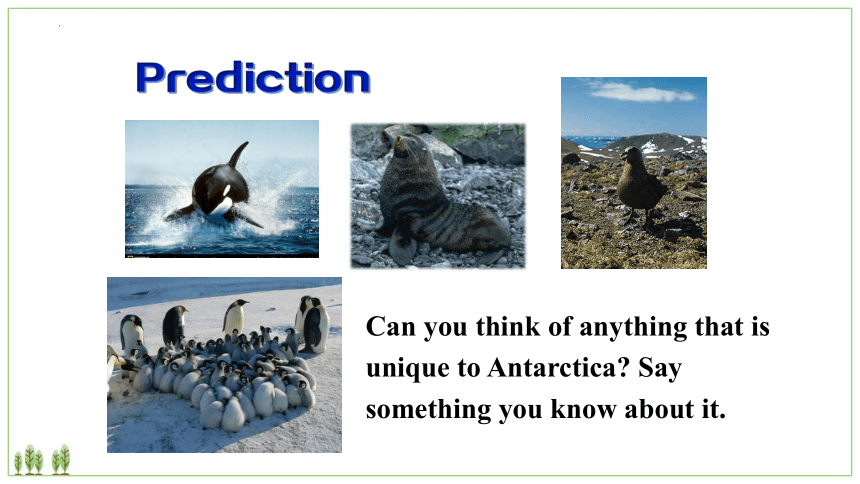
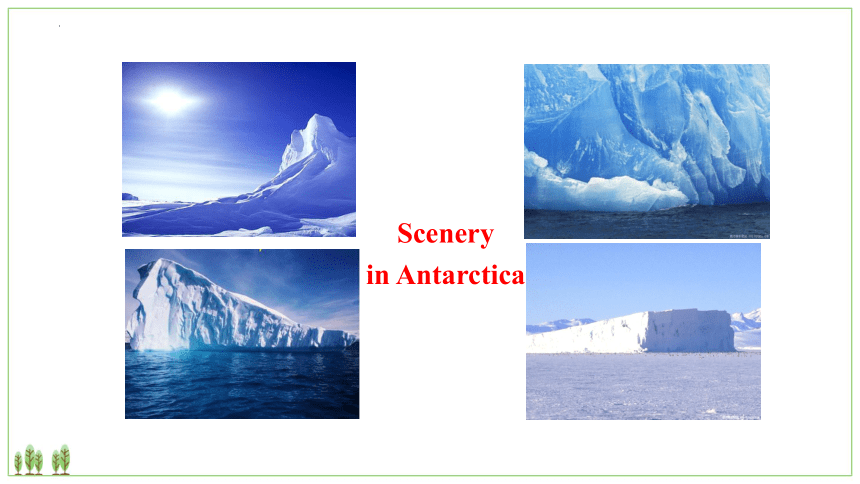
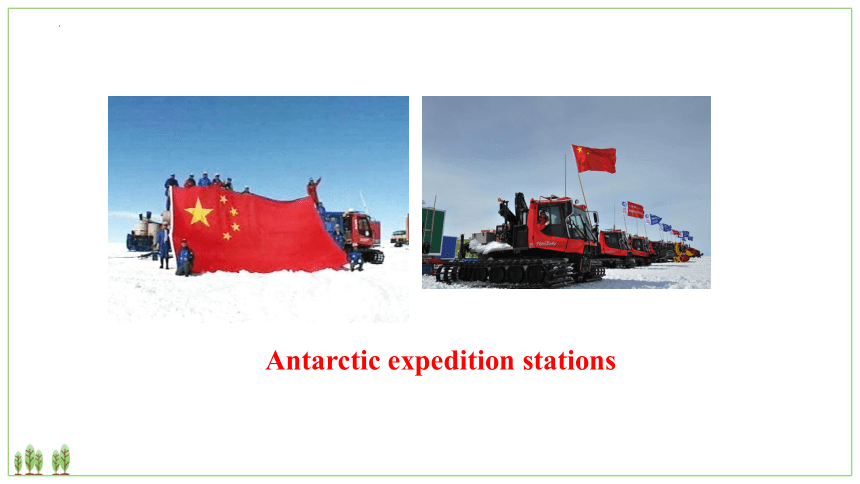
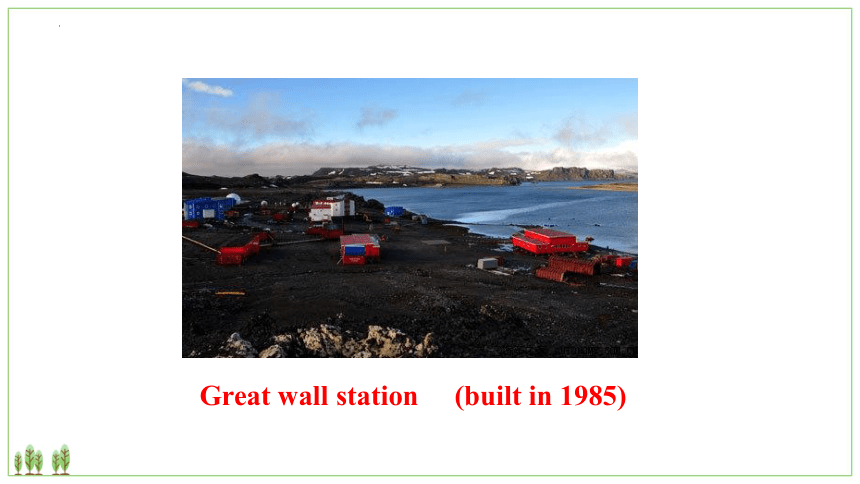
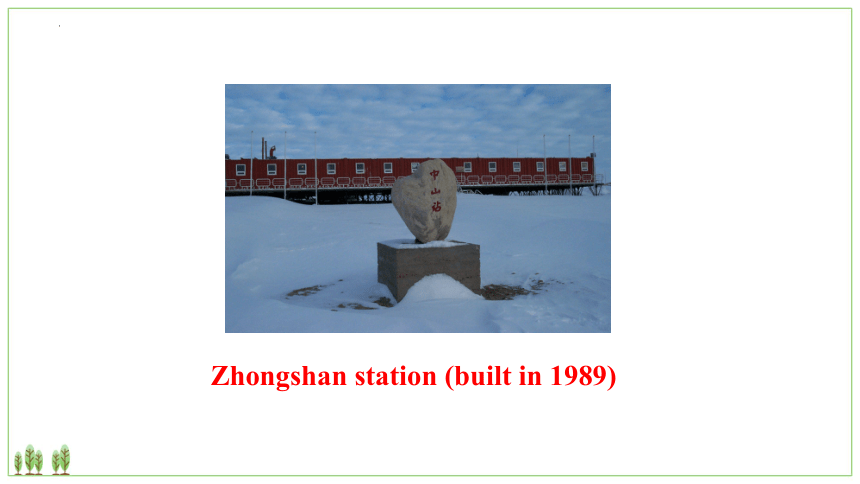
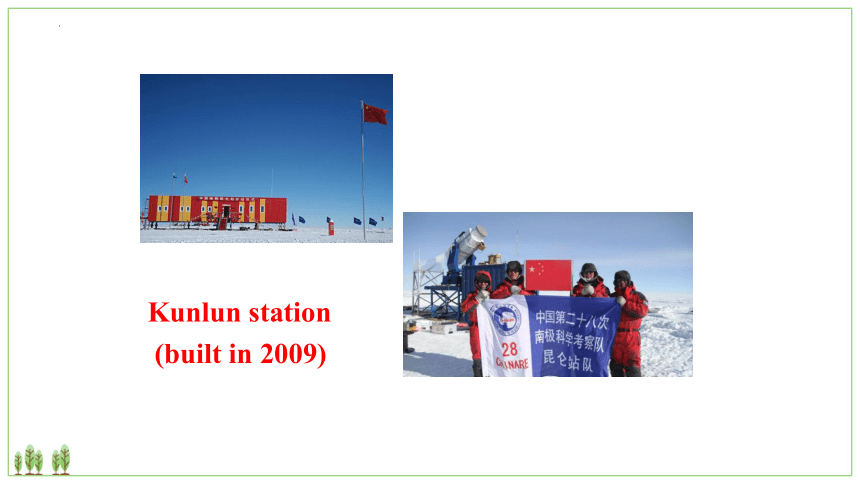
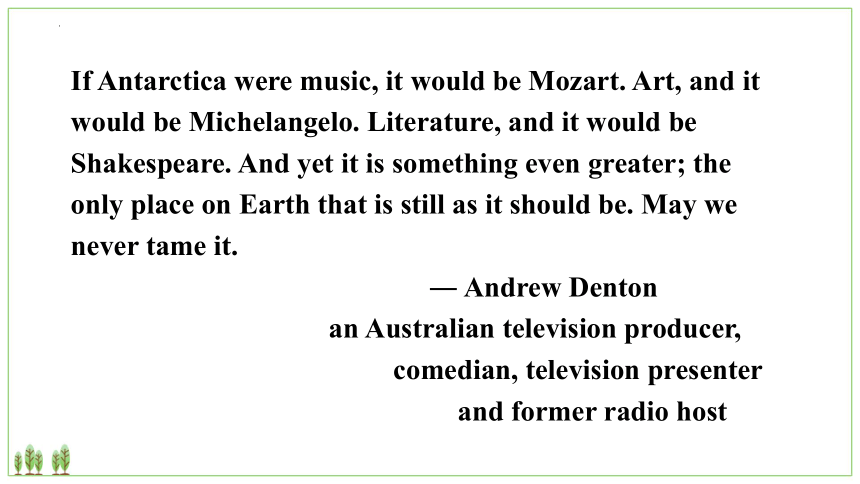
文档简介
(共64张PPT)
Module 1
Deep South
(1)
Antarctica:
the Last Continent
To know more about the Antarctica.
To talk about the Antarctica with scientific words,
using the information in the text or you’ve learned.
To improve reading ability.
1. How many continents are there in the world What are they
2. Is it possible for people to live in Antarctica
Can you think of anything that is unique to Antarctica Say something you know about it.
Scenery
in Antarctica
Antarctic expedition stations
Great wall station (built in 1985)
Zhongshan station (built in 1989)
Kunlun station
(built in 2009)
If Antarctica were music, it would be Mozart. Art, and it would be Michelangelo. Literature, and it would be Shakespeare. And yet it is something even greater; the only place on Earth that is still as it should be. May we never tame it.
― Andrew Denton
an Australian television producer,
comedian, television presenter
and former radio host
根据首字母及英文释义写出单词。
1. a__________ occurring or happening every year or once a year
2. g_________ the force that attracts objects in space towards each other, and that on the earth pulls them towards the centre of the planet, so that things fall to the ground when they are dropped
3. i____________ difficult to stay or live in
annual
gravity
inhospitable
4. e___________ very great in degree
5. b_________ to put your body or sth. else into a position where it is steady and does not fall
6. r________ the total amount of rain that falls in a particular area in a particular amount of time
7. d_________ the distance from the top to the bottom of sth.
balance
rainfall
depth
extreme
8. m_________ a large amount or quantity of sth.; involving a large number of people or things grouped together
9. e__________ the act of travelling through a place in order to find out about it or find something such as oil or gold in it
10. a__________ to gradually change your behaviour and attitudes in order to be successful in a new situation
mass
exploration
adapt
Skim the text and find the main idea.
The passage is mainly about
_______________________________.
the introduction to Antarctica
Read the passage and choose a heading for each paragraph.
A great place for researchers Plants and animals
The Antarctic Treaty The discovery of Antarctica The land
The land
2. Plants and animals
3. A great place for researchers
4. The discovery of Antarctica
5. The Antarctic Treaty
1. How much of the surface is covered permanently in the ice cap
A. 90%. B. 70%.
C. 98%. D. 80%.
2. How long does the long Antarctic winter night last
A. 12 centuries. B. 15 days.
C. 11 centuries. D. 182 days.
Scan the text and choose the right answers.
C
D
3. Which continent was discovered latest
A. America. B. Africa.
C. Antarctica. D. Arctic.
4. Who was the first to land on the Antarctica
A. James Cook.
B. Roald Amundsen.
C. Greek geographers.
D. Carstens Borchgrevink.
C
D
Read the text carefully and choose the best answer.
1. Why does the writer say the Antarctica is a desert
A. Because there is no plant here.
B. Because the annual rainfall here is close to zero.
C. Because it is the coldest place on Earth.
D. Because it has strong wind.
B
2. Which of the following descriptions of Antarctica is true
A. Only two types of plants are found in Antarctica.
B. It is cut in two by the Trans-Antarctic range.
C. There are many kinds of trees on the continent.
D. All Antarctic rocks are meteorites from outer space.
B
3. Why are the Antarctic rocks easy to see
A. Because they are white while the background is black.
B. Because they are black while the background is white.
C. Because they are useful while the background is useless.
D. Because they are outer while the background is inner.
B
4. The aims of the Antarctic Treaty are to________.
A. prevent the commercial and military use of the continent
B. keep Antarctica free from nuclear tests and radioactive waste
C. promote international scientific projects and end arguments about who owns the land
D. all of the above
D
Read Paragraphs 1-3 of the text (pp. 2-3) carefully and fill in the blanks.
Antarctica: the Last Continent
The inhospitable land (Paragraph 1) The climate ★ The coldest and 1. ________ place on Earth
★Rainfall: almost 2. ________
★ Strong winds blowing from the pole to the
coastline and other winds blowing around
the coast
The size ★Covering about 14 million km
★ The 3. ________ largest continent in the
world
driest
zero
fifth
Antarctica: the Last Continent
The inhospitable land (Paragraph 1) The ice ★Holding 4. ________ of the world's ice
★2 km thick on average
★ 5. ________ of the surface of Antarctica
being covered in the ice cap permanently
The landscape ★ 6. ___________________________ running
from east to west and cutting the land in two
★Volcanoes (not very active)
90%
98%
The Trans-Antarctic range
Antarctica: the Last Continent
Animals and plants (Paragraph 2) ★Various 7. ________, flying birds, seals, and whales
★No trees
★Only two types of 8. ________ plants
★The rest plants are mosses, algae and lichen.
Value for research (Paragraph 3) ★ Gases and minerals telling what the world's 9.
________ was like in past ages
★Antarctic rocks (meteorites from outer space)
penguins
flowering
climate
Read Paragraphs 4-5 of the text (p.3) carefully and fill in the blanks.
Greek
James Cook
1895
Roald Amundsen
nuclear
Check the true statements.
1. There are mountains and volcanoes in Antarctica.
2. Not many animals live there.
3. There aren’t many plants.
4. There are lots of white rocks in Antarctica.
5. People guessed that Antarctica existed before it was discovered.
6. The first person on land on Antarctica was British.
7. France was one of the first countries to sign the Antarctica Treaty.
8. The treaty has three main aims.
T
F
T
F
T
F
T
T
Main ideas Supporting information
1. Antarctica is the driest place in the world. A. Only two kinds of flowering plants can be found.
2. The extreme conditions mean that few types of plants can survive there. B. The yearly rainfall there is almost zero.
3. The long-existing ice has become a window on the past. C. People can learn something about the world’s climate in the past by studying the gases and minerals.
Read the text and find the supporting information for the main ideas.
B
A
C
Main ideas Supporting information
4. Antarctic rocks are important for research. D. Some of them may provide evidence of outer space life.
5. Antarctica was the last continent to be discovered. E. In 1895, a Norwegian set foot on the Antarctic mainland.
6. Antarctica has become a symbol of peaceful development of mankind. F. Most countries of the world have signed the treaty.
D
E
F
1. Which sentence in the text can be replaced by the following one
Strictly speaking, Antarctica is a desert since there is almost no rain or snow there all the year round.
___________________________________________
___________________________________________
Read Para. 1 and finish:
With annual rainfall close to zero, Antarctica is technically a desert.
2. Fill in blanks.
Inhospitable: It’s the coldest and the _______ on Earth and 98% of the surface is covered with ____________.
driest
the ice cap
1. What is the topic sentence of Para. 2
Yet Antarctica is full of wildlife, which has adapted to its extreme conditions.
Read Para. 2-3 and finish:
2. What are the animals and plants in Antarctica
ANIMALS:
PLANTS:
different types of penguins, flying birds, seals, and whales.
two types of flowering plants, mosses, algae, and lichen.
moss
苔藓
lichen
地衣
Read Para. 4-5 and finish:
1. Fill in the blanks.
It was the _____ continent to be discovered and the _____ person to set foot on its mainland was Carstens Borchgrevink.
last
first
the first man to set foot on the
Antarctic mainland
Carstens Borchgrevink
2. Translate the sentence into Chinese.
Antarctica has become perhaps the most successful symbol of man’s efforts to work together for progress and peace.
南极洲或许已经成为人类为了和平与发展而共同努力的最后成功的标志。
Read the text carefully and fill in the blanks with the figures in the box.
15th, 1895, 80%, 18th, 182, 70%, 1961, 5, 1911, thousands of
1. In Antarctica, ________ of the fresh water is in a frozen state.
2. In some areas, in Antarctica, the ice can be as thick as ________ kilometres.
3. The winter night in Antarctica can last ________ days.
70%
182
5
15th, 1895, 80%, 18th, 182, 70%, 1961, 5, 1911, thousands of
4. Most of the ice in Antarctica has existed there for ____________ years.
5. The continent of America was discovered in the ________ century.
6. James Cook travelled across the Antarctic Circle in the ________ century.
thousands of
15th
18th
15th, 1895, 80%, 18th, 182, 70%, 1961, 5, 1911, thousands of
7. Carstens Borchgrevink landed on the Continent of Antarctica in ________.
8. People reached the South Pole in the year of ________.
9. In ________, some countries signed a treaty to make Antarctica a nature reserve.
1895
1911
1961
15th, 1895, 80%, 18th, 182, 70%, 1961, 5, 1911, thousands of
10. ________ of the world's population have been involved in the Antarctica protection.
80%
Complete the sentences with words in the box.
adapt depth explore gravity mineral nuclear radioactive rainfall surface trap (v.) treaty
The __________ of something is the top or outside part
of it.
2. If you __________ a place, you hope to discover
something there.
3. If you ___________ to a new situation, you change.
surface
explore
adapt
adapt depth explore gravity mineral nuclear radioactive rainfall surface trap (v.) treaty
4. A __________ is a substance that is formed naturally
in the earth.
5. A __________ is a special written agreement between
different countries.
6. ___________ is the amount of rain which falls in a
particular place.
7. ___________ is a force which makes things fall to earth.
mineral
treaty
rainfall
gravity
adapt depth explore gravity mineral nuclear radioactive rainfall surface trap (v.) treaty
8. If you ___________ something or someone, they can’t
move.
9. ___________ energy comes from the centre of an atom.
10. ____________ means how deep something is.
11. ____________ refers to a dangerous form of nuclear
energy.
trap
nuclear
depth
radioactive
Choose the correct meanings.
continent
(a) a large area of land (b) a small area of land
2. permanently
(a) Most of the time (b) all of the time
3. ice cap
(a) the ice covering the North or South Pole
(b) a thin area of ice
4. inhospitable
(a) exciting (b) unpleasant or difficult to stay
5. seals and whales
fish (b) sea mammals
6. mass
a high area (b) an area without a clear shape
7. reserve
an area of protected land (b) land for building
8. rivalry
(a) working together (b) being in competition
Work in pairs. Decide where the sentences go in the passage.
1. Since then another 32 countries have signed the
treaty.
Paragraph 5, after “… the world’s biggest nature reserve.”
2. Over the next 15 years a number of unsuccessful
journeys to the pole were made by explorers such as
Ernest Shackleton and Robert Scott.
Paragraph 4, after “The race to the pole had begun.”
3. If the ice melted, the sea level would rise by about 60 metres.
Paragraph 1, after “… a depth of five kilometres”
5. Most animals survive thanks to their fat, which
protects them from the cold.
Paragraph 2, after “There are different types of penguins, flying birds, seals and whales.”
4. Some have come from the Moon and Mars.
Paragraph 3, after “Most of them are meteorites from outer space.”
Below is the summary of the text with some words or phrases missing. Choose the right words or phrases from the box to make the summary complete.
trees, ice, frozen, last, wildlife, past ages, nature reserve
Antarctica, the 5th largest continent, is also the coldest and driest. Most of the world's 1. ________ and its fresh water, which is 2. ________, can be found there. Much of it is covered in ice several kilometres thick.
frozen
ice
Strong winds and mountains cutting it in two make it an even more difficult place to live in. Yet it is inhabited by different kinds of 3. ________. However, because of its 182-day winter night, there are few plants and 4. ________. The ice has been there for thousands of years and so it can tell scientists much about 5. ________ and meteorites there can tell them about life far from Earth.
trees, ice, frozen, last, wildlife, past ages, nature reserve
trees
past ages
wildlife
It was the 6. ________ continent to be discovered. Ancient Greeks believed it existed but not until 1895 did someone set foot on it. Today most countries have agreed to keep it free from nuclear testing and ownership, making Antarctica the world's biggest 7. ______________.
trees, ice, frozen, last, wildlife, past ages, nature reserve
last
nature reserve
1. Make a list of reasons to show that Antarctica is inhospitable.
2. Retell the process of the discovery of Antarctica.
3. What can people do to protect the environment of Antarctica
Work in pairs and answer the questions.
1) Why is Antarctica an important place
2) Do you think the Antarctic Treaty is a good idea
Why/Why not
3) What might happen to Antarctica if there wasn’t an international treaty to protect it
4) What other international treaties do you know about
5) What other international treaties do you think the world needs
I. 根据下面各句句意以及所给单词的首字母或汉语提示词,
写出该单词的正确形式(每空一词)。
1. Her work includes measuring the local ________ (降雨量).
2. The building was in a s________ of disrepair.
3. Several of these roses will ________ (开花) this year for the
first time.
4. A greenhouse stays warm because the glass ________ (储存)
the heat of the sun.
rainfall
state
flower
traps
5. As our climate warms up, the ________ (极地的) ice caps
will begin to melt.
6. A m________ of snow and rock broke away and fell on the
climbers.
7. Advertising companies have to think up new ways to
p________ products.
8. ________ (极端的) poverty still exists in many rural areas.
9. Were it not for g________, arrows would continue to fly
forward forever in a straight line.
polar
mass
promote
Extreme
gravity
panies publish ________ (每年的) reports to inform
the public about the previous year’s activities.
11. She ________ (使……平衡) a huge pot effortlessly on
her head and walked down to the river.
12. An e________ is someone who travels to places about
which very little is known, in order to discover what is there.
13. Water normally moves more slowly at shallower d________.
14. The family doctor ordered many expensive medical
________ (试验), which showed no physical problems.
annual
balanced
explorer
depths
tests
II. 选用方框内合适的短语并用其正确形式填空(每个短语
限用一次)。
adapt to, be made up of, set foot on, on average, in the form of, be full of, as a result, in particular
1. ________________ the machine produces one bottle every
two seconds.
2. The whole meal was good but the wine ________________
was excellent.
3. This book ________________ twelve separate short stories.
On average
in particular
is made up of
adapt to, be made up of, set foot on, on average, in the form of, be full of, as a result, in particular
4. She was the first woman to _______________ the
Antarctica in the world.
5. He refused to receive medical treatment in the early
stages of his illness, and ________________ he became
seriously ill.
set foot on
as a result
6. When the kid looked at me, his eyes ________________
tears.
7. The lesson he gives is often ________________ talking
about pictures.
8. It took me a while to ________________ the new job.
adapt to, be made up of, set foot on, on average, in the form of, be full of, as a result, in particular
were full of
in the form of
adapt to
III. 根据括号内的汉语提示补全下面句子(每空一词)。
1. After his beating Colin ________ ________ (逃跑) and
hasn’t been heard of since.
2. The black lettering really ________ ________ (显眼) on
that orange background.
3. The play succeeded ________ ________ (多亏) fine acting
by all the cast.
ran away
stands out
thanks to
4. The hot weather ________ ________ (持续) the whole
month of June in 2017.
5. The population of the city is ________ ________ (接近) a
million.
lasted for
close to
1) Antarctica is an important place because _______________________.
2) I think the Antarctic Treaty is / isn’t necessary because ____________.
3) If there weren’t an international treaty, __________________.
4) Other parts of the world that need to be protected are _________________, because ________________________.
Complete these sentences with your ideas.
Module 1
Deep South
(1)
Antarctica:
the Last Continent
To know more about the Antarctica.
To talk about the Antarctica with scientific words,
using the information in the text or you’ve learned.
To improve reading ability.
1. How many continents are there in the world What are they
2. Is it possible for people to live in Antarctica
Can you think of anything that is unique to Antarctica Say something you know about it.
Scenery
in Antarctica
Antarctic expedition stations
Great wall station (built in 1985)
Zhongshan station (built in 1989)
Kunlun station
(built in 2009)
If Antarctica were music, it would be Mozart. Art, and it would be Michelangelo. Literature, and it would be Shakespeare. And yet it is something even greater; the only place on Earth that is still as it should be. May we never tame it.
― Andrew Denton
an Australian television producer,
comedian, television presenter
and former radio host
根据首字母及英文释义写出单词。
1. a__________ occurring or happening every year or once a year
2. g_________ the force that attracts objects in space towards each other, and that on the earth pulls them towards the centre of the planet, so that things fall to the ground when they are dropped
3. i____________ difficult to stay or live in
annual
gravity
inhospitable
4. e___________ very great in degree
5. b_________ to put your body or sth. else into a position where it is steady and does not fall
6. r________ the total amount of rain that falls in a particular area in a particular amount of time
7. d_________ the distance from the top to the bottom of sth.
balance
rainfall
depth
extreme
8. m_________ a large amount or quantity of sth.; involving a large number of people or things grouped together
9. e__________ the act of travelling through a place in order to find out about it or find something such as oil or gold in it
10. a__________ to gradually change your behaviour and attitudes in order to be successful in a new situation
mass
exploration
adapt
Skim the text and find the main idea.
The passage is mainly about
_______________________________.
the introduction to Antarctica
Read the passage and choose a heading for each paragraph.
A great place for researchers Plants and animals
The Antarctic Treaty The discovery of Antarctica The land
The land
2. Plants and animals
3. A great place for researchers
4. The discovery of Antarctica
5. The Antarctic Treaty
1. How much of the surface is covered permanently in the ice cap
A. 90%. B. 70%.
C. 98%. D. 80%.
2. How long does the long Antarctic winter night last
A. 12 centuries. B. 15 days.
C. 11 centuries. D. 182 days.
Scan the text and choose the right answers.
C
D
3. Which continent was discovered latest
A. America. B. Africa.
C. Antarctica. D. Arctic.
4. Who was the first to land on the Antarctica
A. James Cook.
B. Roald Amundsen.
C. Greek geographers.
D. Carstens Borchgrevink.
C
D
Read the text carefully and choose the best answer.
1. Why does the writer say the Antarctica is a desert
A. Because there is no plant here.
B. Because the annual rainfall here is close to zero.
C. Because it is the coldest place on Earth.
D. Because it has strong wind.
B
2. Which of the following descriptions of Antarctica is true
A. Only two types of plants are found in Antarctica.
B. It is cut in two by the Trans-Antarctic range.
C. There are many kinds of trees on the continent.
D. All Antarctic rocks are meteorites from outer space.
B
3. Why are the Antarctic rocks easy to see
A. Because they are white while the background is black.
B. Because they are black while the background is white.
C. Because they are useful while the background is useless.
D. Because they are outer while the background is inner.
B
4. The aims of the Antarctic Treaty are to________.
A. prevent the commercial and military use of the continent
B. keep Antarctica free from nuclear tests and radioactive waste
C. promote international scientific projects and end arguments about who owns the land
D. all of the above
D
Read Paragraphs 1-3 of the text (pp. 2-3) carefully and fill in the blanks.
Antarctica: the Last Continent
The inhospitable land (Paragraph 1) The climate ★ The coldest and 1. ________ place on Earth
★Rainfall: almost 2. ________
★ Strong winds blowing from the pole to the
coastline and other winds blowing around
the coast
The size ★Covering about 14 million km
★ The 3. ________ largest continent in the
world
driest
zero
fifth
Antarctica: the Last Continent
The inhospitable land (Paragraph 1) The ice ★Holding 4. ________ of the world's ice
★2 km thick on average
★ 5. ________ of the surface of Antarctica
being covered in the ice cap permanently
The landscape ★ 6. ___________________________ running
from east to west and cutting the land in two
★Volcanoes (not very active)
90%
98%
The Trans-Antarctic range
Antarctica: the Last Continent
Animals and plants (Paragraph 2) ★Various 7. ________, flying birds, seals, and whales
★No trees
★Only two types of 8. ________ plants
★The rest plants are mosses, algae and lichen.
Value for research (Paragraph 3) ★ Gases and minerals telling what the world's 9.
________ was like in past ages
★Antarctic rocks (meteorites from outer space)
penguins
flowering
climate
Read Paragraphs 4-5 of the text (p.3) carefully and fill in the blanks.
Greek
James Cook
1895
Roald Amundsen
nuclear
Check the true statements.
1. There are mountains and volcanoes in Antarctica.
2. Not many animals live there.
3. There aren’t many plants.
4. There are lots of white rocks in Antarctica.
5. People guessed that Antarctica existed before it was discovered.
6. The first person on land on Antarctica was British.
7. France was one of the first countries to sign the Antarctica Treaty.
8. The treaty has three main aims.
T
F
T
F
T
F
T
T
Main ideas Supporting information
1. Antarctica is the driest place in the world. A. Only two kinds of flowering plants can be found.
2. The extreme conditions mean that few types of plants can survive there. B. The yearly rainfall there is almost zero.
3. The long-existing ice has become a window on the past. C. People can learn something about the world’s climate in the past by studying the gases and minerals.
Read the text and find the supporting information for the main ideas.
B
A
C
Main ideas Supporting information
4. Antarctic rocks are important for research. D. Some of them may provide evidence of outer space life.
5. Antarctica was the last continent to be discovered. E. In 1895, a Norwegian set foot on the Antarctic mainland.
6. Antarctica has become a symbol of peaceful development of mankind. F. Most countries of the world have signed the treaty.
D
E
F
1. Which sentence in the text can be replaced by the following one
Strictly speaking, Antarctica is a desert since there is almost no rain or snow there all the year round.
___________________________________________
___________________________________________
Read Para. 1 and finish:
With annual rainfall close to zero, Antarctica is technically a desert.
2. Fill in blanks.
Inhospitable: It’s the coldest and the _______ on Earth and 98% of the surface is covered with ____________.
driest
the ice cap
1. What is the topic sentence of Para. 2
Yet Antarctica is full of wildlife, which has adapted to its extreme conditions.
Read Para. 2-3 and finish:
2. What are the animals and plants in Antarctica
ANIMALS:
PLANTS:
different types of penguins, flying birds, seals, and whales.
two types of flowering plants, mosses, algae, and lichen.
moss
苔藓
lichen
地衣
Read Para. 4-5 and finish:
1. Fill in the blanks.
It was the _____ continent to be discovered and the _____ person to set foot on its mainland was Carstens Borchgrevink.
last
first
the first man to set foot on the
Antarctic mainland
Carstens Borchgrevink
2. Translate the sentence into Chinese.
Antarctica has become perhaps the most successful symbol of man’s efforts to work together for progress and peace.
南极洲或许已经成为人类为了和平与发展而共同努力的最后成功的标志。
Read the text carefully and fill in the blanks with the figures in the box.
15th, 1895, 80%, 18th, 182, 70%, 1961, 5, 1911, thousands of
1. In Antarctica, ________ of the fresh water is in a frozen state.
2. In some areas, in Antarctica, the ice can be as thick as ________ kilometres.
3. The winter night in Antarctica can last ________ days.
70%
182
5
15th, 1895, 80%, 18th, 182, 70%, 1961, 5, 1911, thousands of
4. Most of the ice in Antarctica has existed there for ____________ years.
5. The continent of America was discovered in the ________ century.
6. James Cook travelled across the Antarctic Circle in the ________ century.
thousands of
15th
18th
15th, 1895, 80%, 18th, 182, 70%, 1961, 5, 1911, thousands of
7. Carstens Borchgrevink landed on the Continent of Antarctica in ________.
8. People reached the South Pole in the year of ________.
9. In ________, some countries signed a treaty to make Antarctica a nature reserve.
1895
1911
1961
15th, 1895, 80%, 18th, 182, 70%, 1961, 5, 1911, thousands of
10. ________ of the world's population have been involved in the Antarctica protection.
80%
Complete the sentences with words in the box.
adapt depth explore gravity mineral nuclear radioactive rainfall surface trap (v.) treaty
The __________ of something is the top or outside part
of it.
2. If you __________ a place, you hope to discover
something there.
3. If you ___________ to a new situation, you change.
surface
explore
adapt
adapt depth explore gravity mineral nuclear radioactive rainfall surface trap (v.) treaty
4. A __________ is a substance that is formed naturally
in the earth.
5. A __________ is a special written agreement between
different countries.
6. ___________ is the amount of rain which falls in a
particular place.
7. ___________ is a force which makes things fall to earth.
mineral
treaty
rainfall
gravity
adapt depth explore gravity mineral nuclear radioactive rainfall surface trap (v.) treaty
8. If you ___________ something or someone, they can’t
move.
9. ___________ energy comes from the centre of an atom.
10. ____________ means how deep something is.
11. ____________ refers to a dangerous form of nuclear
energy.
trap
nuclear
depth
radioactive
Choose the correct meanings.
continent
(a) a large area of land (b) a small area of land
2. permanently
(a) Most of the time (b) all of the time
3. ice cap
(a) the ice covering the North or South Pole
(b) a thin area of ice
4. inhospitable
(a) exciting (b) unpleasant or difficult to stay
5. seals and whales
fish (b) sea mammals
6. mass
a high area (b) an area without a clear shape
7. reserve
an area of protected land (b) land for building
8. rivalry
(a) working together (b) being in competition
Work in pairs. Decide where the sentences go in the passage.
1. Since then another 32 countries have signed the
treaty.
Paragraph 5, after “… the world’s biggest nature reserve.”
2. Over the next 15 years a number of unsuccessful
journeys to the pole were made by explorers such as
Ernest Shackleton and Robert Scott.
Paragraph 4, after “The race to the pole had begun.”
3. If the ice melted, the sea level would rise by about 60 metres.
Paragraph 1, after “… a depth of five kilometres”
5. Most animals survive thanks to their fat, which
protects them from the cold.
Paragraph 2, after “There are different types of penguins, flying birds, seals and whales.”
4. Some have come from the Moon and Mars.
Paragraph 3, after “Most of them are meteorites from outer space.”
Below is the summary of the text with some words or phrases missing. Choose the right words or phrases from the box to make the summary complete.
trees, ice, frozen, last, wildlife, past ages, nature reserve
Antarctica, the 5th largest continent, is also the coldest and driest. Most of the world's 1. ________ and its fresh water, which is 2. ________, can be found there. Much of it is covered in ice several kilometres thick.
frozen
ice
Strong winds and mountains cutting it in two make it an even more difficult place to live in. Yet it is inhabited by different kinds of 3. ________. However, because of its 182-day winter night, there are few plants and 4. ________. The ice has been there for thousands of years and so it can tell scientists much about 5. ________ and meteorites there can tell them about life far from Earth.
trees, ice, frozen, last, wildlife, past ages, nature reserve
trees
past ages
wildlife
It was the 6. ________ continent to be discovered. Ancient Greeks believed it existed but not until 1895 did someone set foot on it. Today most countries have agreed to keep it free from nuclear testing and ownership, making Antarctica the world's biggest 7. ______________.
trees, ice, frozen, last, wildlife, past ages, nature reserve
last
nature reserve
1. Make a list of reasons to show that Antarctica is inhospitable.
2. Retell the process of the discovery of Antarctica.
3. What can people do to protect the environment of Antarctica
Work in pairs and answer the questions.
1) Why is Antarctica an important place
2) Do you think the Antarctic Treaty is a good idea
Why/Why not
3) What might happen to Antarctica if there wasn’t an international treaty to protect it
4) What other international treaties do you know about
5) What other international treaties do you think the world needs
I. 根据下面各句句意以及所给单词的首字母或汉语提示词,
写出该单词的正确形式(每空一词)。
1. Her work includes measuring the local ________ (降雨量).
2. The building was in a s________ of disrepair.
3. Several of these roses will ________ (开花) this year for the
first time.
4. A greenhouse stays warm because the glass ________ (储存)
the heat of the sun.
rainfall
state
flower
traps
5. As our climate warms up, the ________ (极地的) ice caps
will begin to melt.
6. A m________ of snow and rock broke away and fell on the
climbers.
7. Advertising companies have to think up new ways to
p________ products.
8. ________ (极端的) poverty still exists in many rural areas.
9. Were it not for g________, arrows would continue to fly
forward forever in a straight line.
polar
mass
promote
Extreme
gravity
panies publish ________ (每年的) reports to inform
the public about the previous year’s activities.
11. She ________ (使……平衡) a huge pot effortlessly on
her head and walked down to the river.
12. An e________ is someone who travels to places about
which very little is known, in order to discover what is there.
13. Water normally moves more slowly at shallower d________.
14. The family doctor ordered many expensive medical
________ (试验), which showed no physical problems.
annual
balanced
explorer
depths
tests
II. 选用方框内合适的短语并用其正确形式填空(每个短语
限用一次)。
adapt to, be made up of, set foot on, on average, in the form of, be full of, as a result, in particular
1. ________________ the machine produces one bottle every
two seconds.
2. The whole meal was good but the wine ________________
was excellent.
3. This book ________________ twelve separate short stories.
On average
in particular
is made up of
adapt to, be made up of, set foot on, on average, in the form of, be full of, as a result, in particular
4. She was the first woman to _______________ the
Antarctica in the world.
5. He refused to receive medical treatment in the early
stages of his illness, and ________________ he became
seriously ill.
set foot on
as a result
6. When the kid looked at me, his eyes ________________
tears.
7. The lesson he gives is often ________________ talking
about pictures.
8. It took me a while to ________________ the new job.
adapt to, be made up of, set foot on, on average, in the form of, be full of, as a result, in particular
were full of
in the form of
adapt to
III. 根据括号内的汉语提示补全下面句子(每空一词)。
1. After his beating Colin ________ ________ (逃跑) and
hasn’t been heard of since.
2. The black lettering really ________ ________ (显眼) on
that orange background.
3. The play succeeded ________ ________ (多亏) fine acting
by all the cast.
ran away
stands out
thanks to
4. The hot weather ________ ________ (持续) the whole
month of June in 2017.
5. The population of the city is ________ ________ (接近) a
million.
lasted for
close to
1) Antarctica is an important place because _______________________.
2) I think the Antarctic Treaty is / isn’t necessary because ____________.
3) If there weren’t an international treaty, __________________.
4) Other parts of the world that need to be protected are _________________, because ________________________.
Complete these sentences with your ideas.
